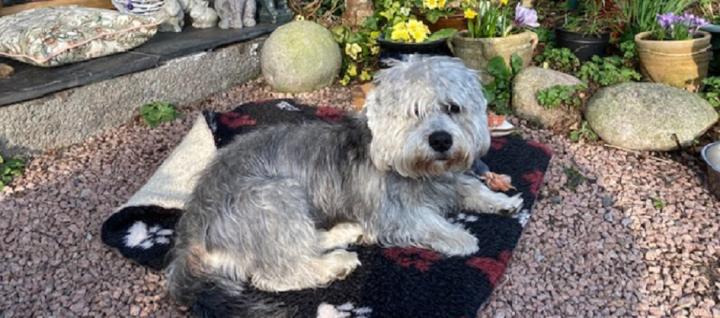Terrier now living pain free after treatment for serious gastrointestinal condition
Suspected spinal pain diagnosed as eosinophilic enteritis

A young dog who was in constant discomfort is now living pain free following successful treatment for a serious gastrointestinal condition.
Angus, a three-year-old Dandie Dinmont terrier, was originally referred to our Neurology service in 2021 with episodes of suspected lumbar pain.
After examination and a series of tests (including an MRI and abdominal scan of his abdomen), Angus was diagnosed with myositis of the gluteal muscles but also had eosinophilic inflammation on his liver, spleen and mesenteric lymph nodes. After watching Angus move and videos provided by his owners, our Neurology and Canine Internal Medicine teams suspected that his pain could be abdominal rather than spinal.
Angus was discharged with a strict hypoallergenic diet but was readmitted shortly afterwards as his health deteriorated. Upper and lower gastrointestinal endoscopic biopsies confirmed eosinophilic enteritis, the same type of inflammation found previously on his liver and lymph nodes, and suspected also of causing the inflammation of his gluteal muscles. Angus was prescribed prednisolone and was also given some worming medication to help reduce the inflammation in his intestine.
Our clinicians and Angus’s own vets closely monitored his progress and, a year and a half after his diagnosis, Angus is doing well on his hypoallergenic diet and personalised nutritional plan developed by our Nutrition nurse. Angus no longer requires prednisolone, lives pain free, has regained weight and is back to his energetic self.
About the Royal (Dick) School of Veterinary Studies
The Royal (Dick) School of Veterinary Studies is a one-of-a-kind centre of excellence in clinical activity, teaching and research. Our purpose-built campus, set against the backdrop of the beautiful Pentland Hills Regional Park, is home to more than eight hundred staff and almost fourteen hundred students, all of whom contribute to our exceptional community ethos.
The School comprises:
The Global Academy of Agriculture and Food Systems
The Hospital for Small Animals
The Jeanne Marchig International Centre for Animal Welfare Education
We represent the largest concentration of animal science-related expertise in Europe, impacting local, regional, national and international communities in terms of economic growth, the provision of clinical services and the advancement of scientific knowledge.

